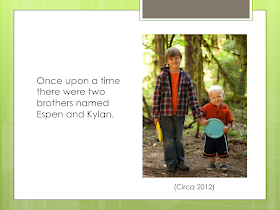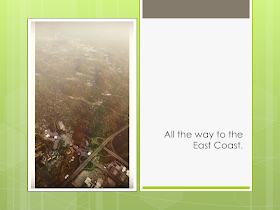 |
| Photo of my grandpa, Ralph Beebe, and me a few years ago when we got to teach a class together (Photo credit: Joel Bock) |
For my Environmental History class this semester, I got to conduct an interview with a family member regarding my own environmental history. I enjoyed meeting with my grandpa, Ralph Beebe, and talking with him about his recollections of his own life and lives of his parents as they established homesteads in Idaho. It was fun talking with him about issues we'd never thought to talk about before, like how his family got food when he was a kid. I learned I have a lot in common with his mother, canning and growing a lot of our food, and I'm a composite of him, his mother, and my own parents: connected to the land, focused on faith and social justice, and interested in organic, healthy food options. These come down to me through different generations so that I do not share the same concerns and worldviews as do my ancestors, but I can see how each of these values came to me through my family history. And do, without further ado, my story.
I spent some time with my maternal grandparents recently. My grandpa, Ralph Beebe, has a PhD in history, and at age 82 he's currently working on a memoir of his life. This assignment gave me the excuse to talk with him about memories I hadn't discussed with him before. I greatly enjoyed meeting with him and learning more about his life and perspective. (My grandma, unfortunately, has Alzheimer's, and so I learned about her family through my grandpa, as well as through stories my great-grandma Hazel wrote down, but I don't have the space to discuss that part of my history here.)
He and I both live in a small town in western Oregon's Willamette Valley. To me, this feels like my family's home. This is where I grew up and where my dad grew up; it's where my parents went to college and met. But just a few generations back, my ancestors lived in the midwest and then in Idaho and eastern Oregon. I'll mainly focus here on my grandpa's recollections, due to the brevity of this paper. I'll add a few thoughts about my dad's side of the family toward the end.
 |
| My great-grandparents' grave stone |
Ralph's father, Glen, was born on a farm in Cheyenne, Wyoming in 1894, and his family moved to Rupert, Idaho around 1914 for now-unknown reasons. Similarly, Ralph's mother, Fanny, was born in 1900 and grew up on a farm in Missouri. She moved to Rupert, Idaho with her father and two brothers (out of a total of 10 siblings) in 1914. She conducted all the chores that go along with running the house as her father and brothers homesteaded their new land. This included cooking, growing vegetables, butchering and preparing meat, and going out with a rifle to shoot rabbits. There is no current family memory of where these families came from before the midwest, although we are presumably mainly of European descent.
 |
| Cattle ranch in Idaho, similar to my great-grandparents' homestead |
Ralph remembers their cash crops as dairy cows, alfalfa, wheat, sugar beets, and corn (though the alfalfa mainly fed the cows). He remembers his mother gardening and raising chickens and pigs, along with the farm's many dairy cows. He helped weed the garden and gather eggs. He also remembers harvesting beets. They lived mainly on the food his mother canned, as well as the eggs, milk, and meat from their animals. He remembers getting a refrigerator after World War II.
He had the opportunity to go to college, which he considers very lucky, because he says he's not smart enough to be a farmer. He's book smart, of course, but not as mechanically minded as one needs to be in order to fix tractors, fences, and everything else that can go wrong on a farm. He moved off the land, but his brother stayed, and his nephew now runs the same farm. I've been there a number of times, floating the irrigation ditches on inner tubes as a kid.
I asked my grandpa his thoughts on the changes that have occurred in his lifetime. He recognizes that some people are really connected to the land that they work, the land that raises food for them and their families, but he never had that sense of the land. He likes the farm, and he appreciates the people who work it, and the hard work they do, but for him, a connection to the land seems like more of a personality characteristic or personal interest someone might have, rather than something everyone will experience.
 |
| My dad's 12th birthday |
One final note regarding my dad's side of the family is that my dad moved to Oregon, from Iowa in 1963, and the house he grew up in is now part of the property of the university where I coordinate a community garden. There are fruit trees in the backyard of his old house and the neighboring houses--apples, pears, and plums--and I've been preserving the apples from those trees this week.
In the scope of human history, my family does not have a long history on this land. But in the scope of present-day American experience, I'm incredibly connected to this town, this little corner of the Willamette Valley called Chehalem Valley. I'm putting down my own roots here, benefiting from the forethought of my grandparents and their friends when they planted the fruit trees that will sustain my family this winter.
As an aside, I've attached a photo I took of my grandma's ration card booklet from World War II!













































